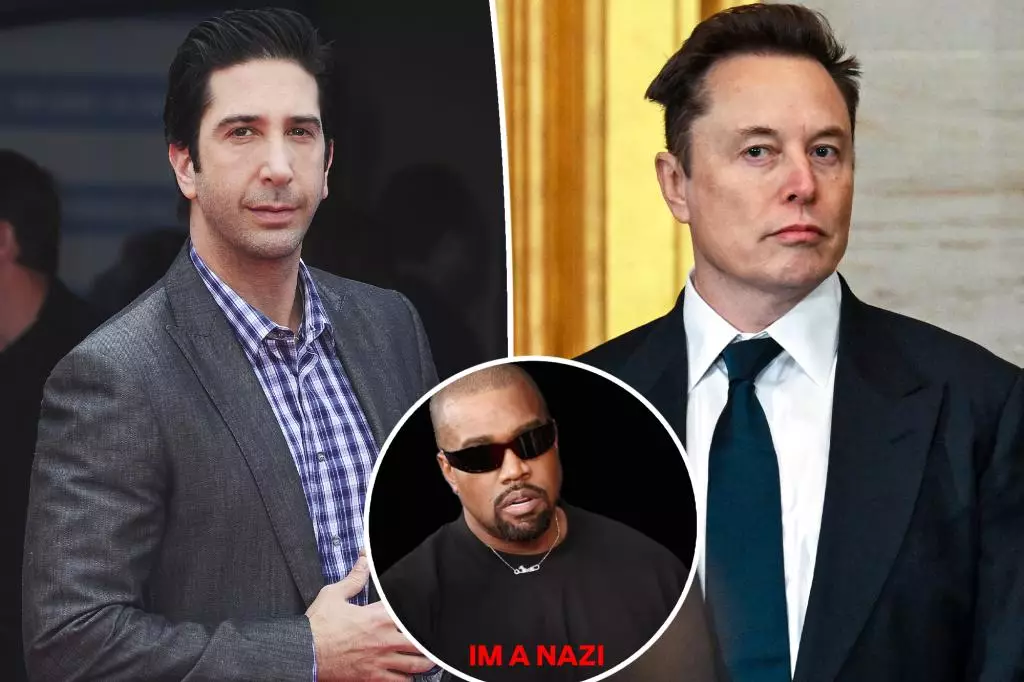In a world increasingly driven by social media, the voices of public figures—be they entertainers, politicians, or social activists—carry immense power. Recently, David Schwimmer, renowned for his role in “Friends,” used his platform to respond to the controversial remarks made by rapper Kanye West, who has adopted the moniker Ye in recent years. Schwimmer’s impassioned plea to Elon Musk, the owner of the social media platform X (formerly Twitter), underscores a broader societal concern regarding the spread of hate speech and the role of influential individuals in shaping public discourse.
Kanye West has been no stranger to controversy, often courting attention for his erratic behavior and inflammatory remarks. However, his recent foray into openly anti-Semitic sentiments raises pressing questions about accountability in the digital age. Schwimmer’s call for action against West’s tweets is not merely a personal attack; it represents a challenge to society to confront the insidious nature of hate speech, particularly when it emanates from influential figures.
West’s comments, including explicit declarations of racism and anti-Semitism, pose significant dangers not only to marginalized communities but also to the integrity of social discourse as a whole. In an age where misinformation spreads like wildfire, it’s critical to consider how the signals sent by public figures can have real-world consequences. Schwimmer’s remarks that “silence is complicity” capture this essence; when hate is tolerated or unchallenged, it not only emboldens the perpetrator but can lead to violence against vulnerable groups.
The challenge of dealing with such expressions lies in balancing free speech with the need to protect individuals and communities from harm. Social media platforms are often ill-equipped to navigate this intricate landscape, leading to a patchwork of policies that may or may not effectively address the spread of harmful ideologies. Schwimmer’s insistence on removing West from X illustrates a profound frustration with grassroots calls for accountability amid widespread inaction from regulatory bodies and platforms that fail to take a definitive stance against hate speech.
Celebrities like West wield an enormous influence over their audience—his 32.7 million followers illustrate just how far-reaching his words can be. When an individual who commands such attention publicly declares anti-Semitic sentiments or glorifies figures like Adolf Hitler, it reverberates deeply within wider society. The implications are sobering: how many people are swayed by these remarks? How many might feel justified in expressing or acting out their prejudices due to West’s platform?
Moreover, West’s remarks intertwine with a disturbing trend of celebrities leveraging their fame to promote extremist ideologies. This not only muddies the waters around critical issues such as racism and anti-Semitism but also risks alienating individuals who might otherwise be open to dialogue. Instead of fostering discussion and understanding, these public declarations entrench divisions, polarizing communities and undermining the hard-fought efforts toward inclusivity.
The backlash against Kanye West’s comments shows that many people are no longer willing to accept hateful rhetoric as the status quo. Schwimmer is just one voice among many demanding accountability, highlighting a growing movement to combat hate in all its forms. Community-led initiatives are increasingly stepping up, advocating against all expressions of bigotry while promoting messages of tolerance and understanding.
Social media has the potential to serve as a tool for positive change, driving awareness and creating conversations that matter. The responses from various communities, including Jewish organizations and individuals, signify resilience amid adversity. They reinforce the notion that public figures cannot espouse hate without facing consequences.
As discussions about the importance of moderating hate speech continue, it’s clear that a collective response is essential. Individuals, communities, and platforms must work collaboratively to foster a culture that encourages open dialogue while firmly rejecting harmful ideologies. Schwimmer’s appeal to Elon Musk represents not just a personal concern; it’s a clarion call for all of us to reflect on our roles in challenging hate.
The responsibility lies not only with influential individuals but also with each of us to challenge bigotry in our spheres of influence. In doing so, we can help to cultivate a world where every voice is respected and every community is valued, effectively nullifying the harmful impacts of hate speech in our society.

Leave a Reply